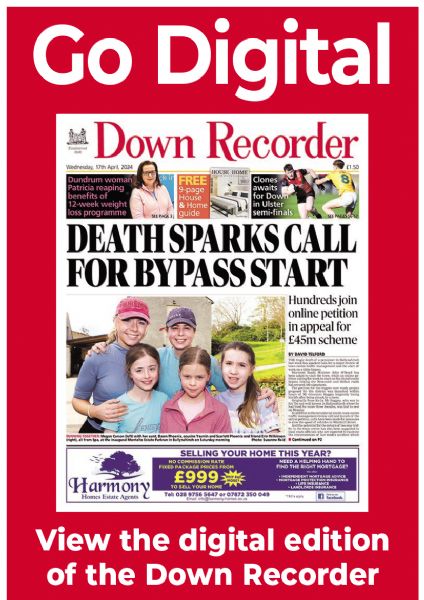Health official warns care model will neglect survivors
Health official warns care model will neglect survivors
24 July 2019
A LEADING health official has warned that the long term needs of stroke survivors in the area will continue to be neglected under the planned roll out of a new model of care.
The Department of Health is currently asking the public for its views on a radical overhaul of stroke services which will see the creation of specialist units offering 24-hour access to services to provide faster diagnosis and treatment.
Health officials insist that the planned changes — which are out to public consultation until Friday of next week — will reduce disabilities suffered by stroke patients and save more lives.
However, the Northern Ireland Chest Heart and Stroke charity fears that as the long term needs of local stroke survivors is currently not being met “they will continue to be neglected” under the new service model.
Neil Johnston, the charity’s public affairs adviser, said that to date the public’s attention has been very much focused on what happens in the first 72 hours after a stroke and where those services are located.
He said it was important to remember that there were nearly 40,000 stroke survivors across Northern Ireland, including many in the South Down area who needed support, often in the long-term.
Mr Johnston said that following a stroke it was estimated that over a third of patients need and will benefit from, on-going support from the health service.
“People need support,” he continued. “They may need physiotherapy, speech and language and occupational therapy. It is recognised that the current service is unable to meet the longer term needs that exist. This is very disheartening because we know that, with the right support, many people can make significant improvements.”
Mr Johnston said NI Chest, Heart and Stroke was concerned that the current consultation exercise does not contain enough detail about how these patient needs will be addressed and is urging the public when they are responding to press for more detail on this area and for extra resources to be made available.
He added: “We know from the people who attend our support groups and programmes that there is significant need and that with the right support many people can, through teamwork, learn to manage their condition.
“It is vitally important that the needs of stroke survivors receive as much attention from this consultation exercise as the debate about which hospital buildings are used to deliver services”.
Down Community Health Committee chairman, Eamonn McGrady, said the concerns of NI Chest, Heart and Stroke about patient services applied across all of South Down.
“According to the charity, current stroke care needs are not being met. The fact is that you have to put the additional resources in place to build confidence in communities before you can persuade them to accept change,” he said.
“The difficulty is that communities don’t accept change because they have been told so often about what can be delivered into the future and what additional resources will be available. But, in the final analysis, it was often seen that our community was one of the ones which lost out, eroding people’s confidence.”
Mr McGrady said what people wanted to see was investment in services, the build-up of staffing numbers and the needs of people across the community being dealt with.
“The views of Chest, Heart and Stroke are welcome and it is important that there is an excellent resource within the community capable of delivering and sustaining stroke services. Critical to this will be swift ambulance response times.
“Support for all those thousands of people who live with a disability as a result of stroke is vital and it must be remembered that for every person living with disability, there is very frequently three or four close family members who are massively directly affected as well,” continued the health group’s chairman.
“In reality, a very large portion of the population find themselves affected by stroke, directly or indirectly and there are places where excellent care is delivered. But there is a very key role for so-called step down care and it’s important that this specialist stroke care is made available in local hospitals such as the Downe in Downpatrick which is ideally placed to provide this.
“We know that we are not going to have a hyperacute stroke unit in our area, but we can have a large resource based at the Downe to serve the needs of East and South Down and the lower Ards peninsula. There is no reason why that should not be done.”
Describing the Downe as an “excellent, modern hospital” which boasted easy access for patients, particularly those who may suffer from mobility issues, Mr McGrady said the hospital was an ideal location for a step down facility to allow stroke patients to continue with their rehabilitation after initial treatment in a specialist centre.
Mr McGrady added: “There is a health and inequality issue that arises for rural communities in connection with all of these issues and that has to be addressed. The whole point about any type of change in the health service and investment is that it must be used to address the inequality between the rural and urban citizens which has never happened before.
“That now has to happen and this stroke consultation on the way forward is the opportunity to do it. This is also the acid test of the government’s commitment towards rural communities and rural living. It is not enough to talk about equality impact assessments, what people want to see is actual delivery.”

